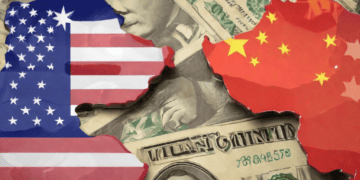Sino-Australian relations took a concerning turn recently with China imposing substantial tariffs on Australian barley imports, marking a potential escalation in global trade tensions. Approximately 30% of Australia’s exports head to China, making this decision particularly impactful, especially in the wake of China’s blacklisting of four Australian beef exporters. Despite these moves, Australia has refrained from implementing retaliatory tariffs, fueling speculation about the underlying complexities of this standoff. This situation’s ripple effects are evident, considering the recent deceleration in the Australian dollar’s rally.
Australia’s Stance on COVID Investigation and Its Fallout
Historically, diplomatic conflicts between China and Australia have been commonplace, often stemming from Australia aligning itself with the United States on contentious global issues. During the COVID-19 pandemic, Australia prioritized its alliance with the U.S. by advocating for an international investigation into the virus’s origins, a stance also echoed by President Trump. Predictably, China reacted adversely to this call for an inquiry, despite ultimately supporting a less accusatory resolution proposed by the European Union at the World Health Assembly.
Ongoing Tensions and Trade Dynamics
Australia’s steadfastness in critiquing China hasn’t gone unnoticed in Beijing. Recent actions, including naval exercises with the U.S. and barring Huawei from its 5G network, have strained relations further. China’s bans on Australian meat processors and the substantial tariffs on barley hint at a less forgiving stance. Although China cites technical violations and subsidy disputes as reasons for these measures, the timing suggests deeper geopolitical undercurrents.
Potential Economic Ramifications
The specter of additional trade restrictions looms over Australia, potentially extending beyond agriculture to wine and dairy exports. While tariffs on these goods might not hit as hard as those on major resources like iron ore and coal, they pose a significant blow to an economy already on the brink of its first recession in nearly three decades.
Navigating Future Risks
Prime Minister Scott Morrison’s administration has refrained from immediate retaliation, signaling a desire to seek resolution through international channels like the World Trade Organization. However, concerns persist that Australia’s alignment with the U.S. might jeopardize its agricultural exports to China, potentially benefiting American trade interests.
Impact on Key Industries and the Currency
While Australia’s mining sector appears relatively insulated from punitive tariffs due to its indispensable role in supplying metals and minerals to China, other sectors like tourism and education face vulnerability. This uncertainty also affects the Australian dollar, which, despite recent gains, remains susceptible to China-related risks.
The Road Ahead
The Australian dollar’s recent upswing, fueled by positive sentiments surrounding the country’s handling of the pandemic, faces uncertainties amid warnings of a slower recovery and escalating tensions between major global players. A bullish shift in the currency’s trajectory might be hampered by the unpredictable nature of Sino-Australian and Sino-U.S. relations, potentially leading to a retreat in value should the situation deteriorate further.
As Australia navigates these complexities, the delicate balance between economic stability and geopolitical allegiances remains a key focal point, influencing not only the economy but also the trajectory of its currency in the global market.
Stay informed on supply chain news at The Supply Chain Report. Free international trade tools are at ADAMftd.com.
#SinoAustralianRelations #ChinaTariffs #AustraliaTradeTensions #BarleyImports #AustralianBeef #GlobalTradeTensions #COVID19Investigation #AustraliaChinaDiplomacy #ScottMorrison #TradeConflict #ChinaBlacklisting #AustraliaGeopolitics #AustraliaEconomicImpact #MiningSector #AustralianDollar #AustraliaRecession #ChinaExportBan #AustraliaWineDairy #GeopoliticalUncertainty #AustraliaCurrencyImpact #TradeDispute #AustraliaUSAlliance #InternationalTradeDisputes #WorldTradeOrganization #ChinaEconomicInfluence #AustralianAgriculture #ChinaImports #SinoUSRelations















